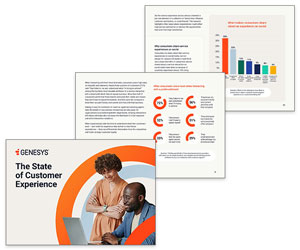New research from Genesys examines how consumers feel about interacting with AI for customer experience (CX) – and how those opinions differ by generation.
According to “The humans and AI in unison: Driving the new era of customer experience” report, there are some similarities.
Despite differing opinions on AI, the majority of respondents (72%) agree they have no hesitations about interacting with AI-powered chatbots – if the technology can quickly resolve their issues.
In fact, half of consumers believe virtual agents will be widely accepted for customer service by 2030. And concerns lessen with each younger generation about whether or not they’ll interact with a bot in the future – with nearly three-fourths (73%) of Generation Z respondents agreeing.
Examining people’s general outlook on the future of AI, more than half (56%) of respondents are uncertain about what’s true or exaggerated.
This is particularly highlighted by the recent hype around generative AI – while 90% of people are familiar with the term, the majority (76%) still know little to nothing about its capabilities.
Even younger generations, who historically have been viewed as early adopters of technological advances, admit to a lack of familiarity with the technology (58% of Gen Z and 66% of millennials).
Without a clear understanding of AI’s capabilities, people have mixed feelings about the technology as reflected in the report findings:
- While four in 10 consumers believe there’s cause for concern with AI, the remaining six consumers aren’t worried or think fears are overblown
- 58% of consumers know someone who’s afraid of AI
- Six in 10 consumers worry AI is making humans lazy and less intelligent
Organizations have an opportunity to demonstrate the value AI can bring to consumers’ everyday lives. From orchestrating more connected customer experiences, to enabling employees and more, AI is transforming the relationship between organizations and consumers for the better.
Humans and AI Working Together Can Equal Better Customer Experience
Research shows that customer service bots are one of the most recognizable forms of AI to consumers.
But after years of providing fragmented interactions, they’ve also earned a bad reputation as one of the most frustrating parts of CX. Now, nearly three-fourths of respondents (72%) fear AI will make it impossible to reach a human agent.
Despite reservations, consumers appreciate the value AI brings to their experiences, with 82% ranking speed — whether shorter hold times or having their issue resolved quicker — as one of its most rewarding benefits. The ability to access customer service 24/7 ranked a close second (81%).
Navigating consumer preferences for being served by bots will be key to maximizing the benefits they provide. What do consumers desire when interacting with AI-powered bots?
- They don’t want emotional empathy from bots: 60% of Americans get angry or frustrated when an AI-powered bot uses language like “I’m sorry” or “I understand your frustration.”
- They desire more transparency: 80% of people say there should be a mandatory notification alerting them if they are speaking to an AI-powered bot or digital assistant.
- They want AI to enable human agents – not own the engagement: Seven in 10 consumers say they’re comfortable with AI-assisting human agents, but prefer to not interact solely with a bot.
- They expect around-the-clock access: Eight in 10 consumers say a 24/7 customer service bot should be able to set up a callback with a live agent at the next available time during business hours.
Consumer views on AI can provide businesses valuable knowledge to navigate the complexity and nuances involved in delivering experiences that satisfy and delight consumers.
As technology continues to advance, business must focus on providing a winning combination of human and AI to meet consumer preferences while optimizing their own workforce.
This blog post has been re-published by kind permission of Genesys – View the Original Article
For more information about Genesys - visit the Genesys Website
Author: Genesys
Published On: 10th May 2024
Read more about - Industry News, Genesys






 Genesys empowers more than 8,000 organisations in over 100 countries to improve loyalty and business outcomes by creating the best experiences for their customers and employees. Through Genesys Cloud, the AI-Powered Experience Orchestration platform, Genesys delivers the future of CX to organisations of all sizes so they can provide empathetic, personalised experience at scale. As the trusted platform that is born in the cloud, Genesys Cloud helps organisations accelerate growth by enabling them to differentiate with the right customer experience at the right time, while driving stronger workforce engagement, efficiency and operational improvements.
Genesys empowers more than 8,000 organisations in over 100 countries to improve loyalty and business outcomes by creating the best experiences for their customers and employees. Through Genesys Cloud, the AI-Powered Experience Orchestration platform, Genesys delivers the future of CX to organisations of all sizes so they can provide empathetic, personalised experience at scale. As the trusted platform that is born in the cloud, Genesys Cloud helps organisations accelerate growth by enabling them to differentiate with the right customer experience at the right time, while driving stronger workforce engagement, efficiency and operational improvements. 











